The Power of Agent Evaluations in Customer Service
by Erina Suzuki | Published On September 8, 2023 | Last Updated March 15, 2024

In the world of customer service, the success of any contact center depends upon the agents' performance.
These dedicated professionals are at the forefront of customer interactions, and their ability to deliver exceptional service directly impacts customer satisfaction and brand loyalty. To ensure consistent, high-quality interactions, contact center managers can utilize a powerful tool known as agent evaluation.
What is agent evaluation?
Agent evaluation is a tool used by contact center managers to assess an agent's performance with a customer interaction. This tool allows managers to read or listen to the interaction between a customer and the agent and evaluate their performance based on the parameters outlined in the form. Evaluations involve analyzing and measuring various aspects of an agent's performance, such as communication skills, problem-solving abilities, adherence to company policies, and overall customer-centric behavior.
The primary goal of agent evaluation is to maintain and enhance the quality of customer interactions, which in turn leads to improved customer satisfaction and service quality.
What are the benefits of agent evaluation?
- Enhanced agent performance: Regular evaluations and feedback empower agents to continually develop their skills. They gain insights into their strengths and weaknesses, leading to improved performance over time.
- Consistent customer service: Agent evaluation ensures all customer interactions adhere to company standards and policies. This consistency in service delivery helps build a strong and trustworthy brand image.
- Improved customer satisfaction: When agents consistently deliver high-quality service, customer satisfaction naturally increases. Positive interactions lead to happier customers who are more likely to remain loyal to your brand.
Using performance metrics for agent evaluation
Performance metrics play an important role in evaluating customer service agents. Here's how companies can effectively utilize performance metrics to measure agent performance:
Define clear objectives: It's essential to define clear objectives that are aligned with the organization's goals and customer service standards. Determine what aspects of agent performance are most critical for success, whether it's response time, resolution rates, customer satisfaction, or other key indicators.
Choose relevant metrics: Choose performance metrics that match the defined objectives. Common metrics for measuring agent performance include first contact resolution (FCR), average response time, customer satisfaction scores (CSAT), net promoter score (NPS), and adherence to service level agreements (SLAs).
Use performance tracking systems: Leverage technology and performance tracking systems to collect and analyze data related to agent performance. These systems are often built into your contact center software. If not, you may need to upgrade or customize your platform.
Provide feedback and coaching: Use performance metrics as a basis for providing ongoing feedback and coaching to agents. Share performance data regularly, identify areas for improvement, and offer targeted training and development opportunities to help agents enhance their skills and capabilities.
Set realistic targets and benchmarks: Establish realistic targets and benchmarks for agent performance based on historical data, industry standards, and organizational objectives. These targets should be challenging yet achievable, providing agents with clear goals to strive towards. Recognize and reward agents who consistently meet or exceed these performance targets.
ComputerTalk provides the option to customize agent evaluation forms through iceManager suites
ComputerTalk is the provider of ice, an omnichannel contact center that enables all communication channels within one platform. ice Contact Center allows contact center managers and supervisors to create evaluation forms to assess their agents' performances. Continue reading to learn the 6 steps to creating an agent evaluation form on iceManager:
1. In iceManager, navigate to the top right corner and select Settings, then proceed to the Evaluation Form Designer section. To initiate the creation of an evaluation form, simply click on the Add (+) button, which will open up the Evaluation Form Designer interface.
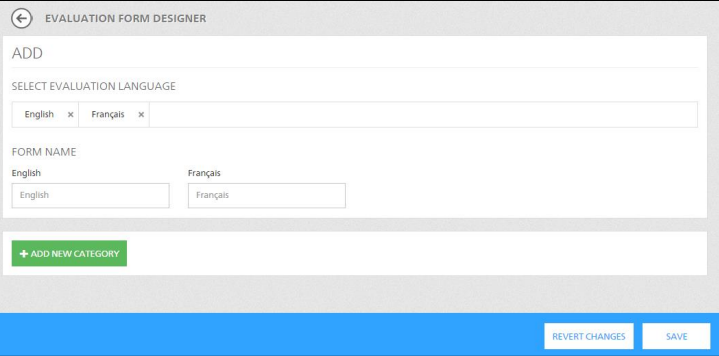
2. Remove the languages you will not be using by clicking the grey X button next to them. The Form Name fields for the languages you remove will automatically disappear. A minimum of one language must be selected.
3. Enter the name of the form. The recommended length for names is less than 25 characters.
4. Click Add New Category to add a new group of questions. Fill in the name field(s).
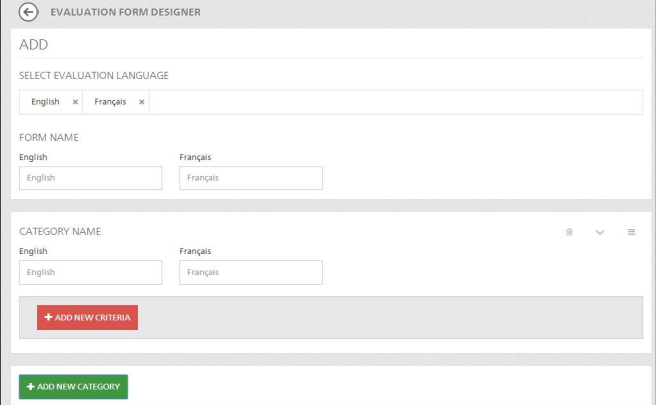
5. To add a question, click Add New Criteria. The criteria area expands to show additional options.
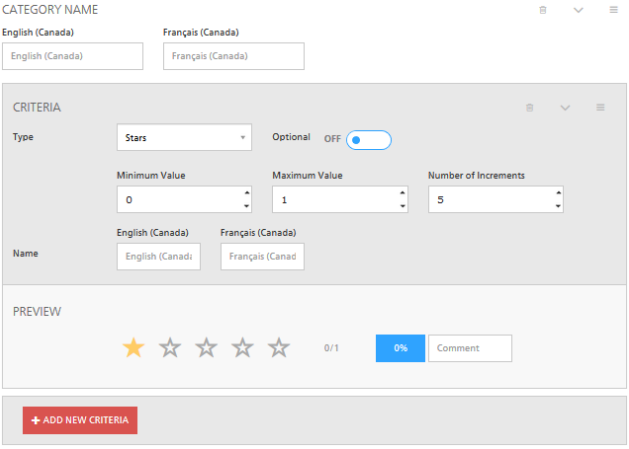
6. Once you are finished, click Add. If you wish to cancel this form, click the left arrow button at the top of the page.
Criteria types
In agent evaluation, criteria types refer to the various categories or characteristics used to assess and measure agent performances. These criteria types are essential for evaluating and providing feedback on an agent's performance.
iceManager offers a variety of criteria types depending on the response required. Some of these criteria types include:
Stars
The Stars criteria can be used to evaluate an agent's attitude.
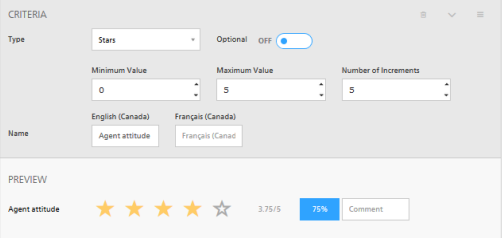
Buttons
The Buttons criteria can be used to evaluate how well the problem was solved.
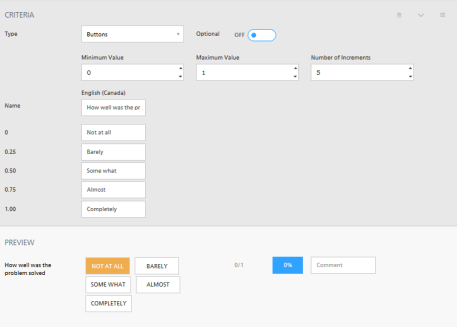
Drop Down
The Drop Down criteria can be used to assess and show whether or not the user passed the evaluation.
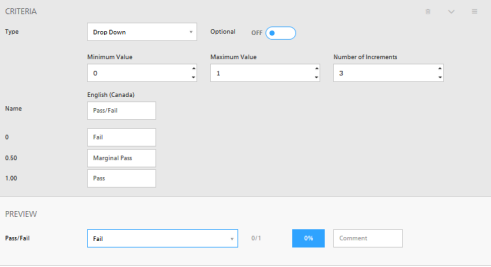
Agent evaluation forms are a useful and valuable tool for analyzing agent performances. They can pinpoint deficits and proficiencies in agent interactions to improve your service quality and increase customer satisfaction. With ice, managers and supervisors can easily create forms, view and download recorded interactions, and fill out evaluation forms at the office, remotely, or while on the go.
For more details on agent evaluation, reach out to a ComputerTalk representative today!
More from our blog
 Microsoft Ignite 2024, happening in Chicago on November 19-22, promises to be an event filled with insights, networking opportunities, and the latest in tech innovation. Whether you're attending in person or virtually, these tips will help you make the most...
Microsoft Ignite 2024, happening in Chicago on November 19-22, promises to be an event filled with insights, networking opportunities, and the latest in tech innovation. Whether you're attending in person or virtually, these tips will help you make the most...
.jpg?sfvrsn=5dd68d0_3) Across industries, organizations are pushing employees back to the office. Leaders cite collaboration, productivity, and company culture as key reasons for the shift.
Across industries, organizations are pushing employees back to the office. Leaders cite collaboration, productivity, and company culture as key reasons for the shift.
.png?sfvrsn=9ac433b5_1) On Wednesday, July 21st, ComputerTalk presented our latest Slice of ice webinar, iceSurvey. During this session, our Training Specialist, Kathika Uthayakumar, provided an overview of iceSurvey (version 11), explained how to create survey questions and survey runs, showed examples of...
On Wednesday, July 21st, ComputerTalk presented our latest Slice of ice webinar, iceSurvey. During this session, our Training Specialist, Kathika Uthayakumar, provided an overview of iceSurvey (version 11), explained how to create survey questions and survey runs, showed examples of...

